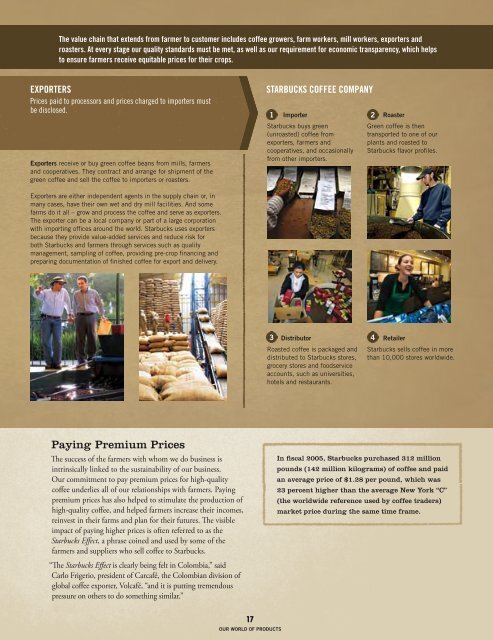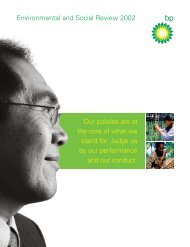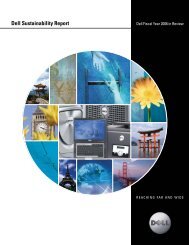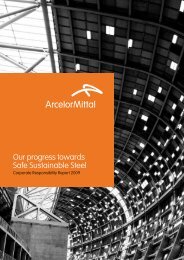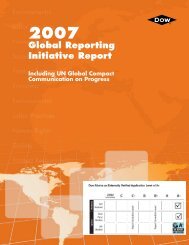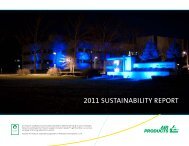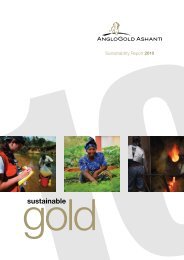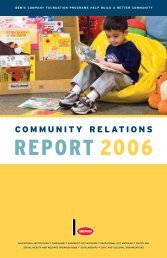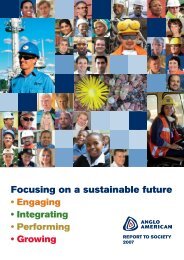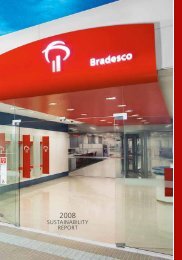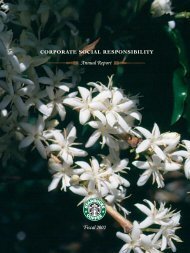Beyond the cup. - Starbucks
Beyond the cup. - Starbucks
Beyond the cup. - Starbucks
You also want an ePaper? Increase the reach of your titles
YUMPU automatically turns print PDFs into web optimized ePapers that Google loves.
The value chain that extends from farmer to customer includes coffee growers, farm workers, mill workers, exporters androasters. At every stage our quality standards must be met, as well as our requirement for economic transparency, which helpsto ensure farmers receive equitable prices for <strong>the</strong>ir crops.EXPORTERSPrices paid to processors and prices charged to importers mustbe disclosed.Exporters receive or buy green coffee beans from mills, farmersand cooperatives. They contract and arrange for shipment of <strong>the</strong>green coffee and sell <strong>the</strong> coffee to importers or roasters.STARBUCKS COFFEE COMPANY1 Importer2<strong>Starbucks</strong> buys green(unroasted) coffee fromexporters, farmers andcooperatives, and occasionallyfrom o<strong>the</strong>r importers.RoasterGreen coffee is <strong>the</strong>ntransported to one of ourplants and roasted to<strong>Starbucks</strong> flavor profiles.Exporters are ei<strong>the</strong>r independent agents in <strong>the</strong> supply chain or, inmany cases, have <strong>the</strong>ir own wet and dry mill facilities. And somefarms do it all – grow and process <strong>the</strong> coffee and serve as exporters.The exporter can be a local company or part of a large corporationwith importing offices around <strong>the</strong> world. <strong>Starbucks</strong> uses exportersbecause <strong>the</strong>y provide value-added services and reduce risk forboth <strong>Starbucks</strong> and farmers through services such as qualitymanagement, sampling of coffee, providing pre-crop financing andpreparing documentation of finished coffee for export and delivery.3 Distributor4Roasted coffee is packaged anddistributed to <strong>Starbucks</strong> stores,grocery stores and foodserviceaccounts, such as universities,hotels and restaurants.Retailer<strong>Starbucks</strong> sells coffee in morethan 10,000 stores worldwide.Paying Premium PricesThe success of <strong>the</strong> farmers with whom we do business isintrinsically linked to <strong>the</strong> sustainability of our business.Our commitment to pay premium prices for high-qualitycoffee underlies all of our relationships with farmers. Payingpremium prices has also helped to stimulate <strong>the</strong> production ofhigh-quality coffee, and helped farmers increase <strong>the</strong>ir incomes,reinvest in <strong>the</strong>ir farms and plan for <strong>the</strong>ir futures. The visibleimpact of paying higher prices is often referred to as <strong>the</strong><strong>Starbucks</strong> Effect, a phrase coined and used by some of <strong>the</strong>farmers and suppliers who sell coffee to <strong>Starbucks</strong>.“The <strong>Starbucks</strong> Effect is clearly being felt in Colombia,” saidCarlo Frigerio, president of Carcafé, <strong>the</strong> Colombian division ofglobal coffee exporter, Volcafé, “and it is putting tremendouspressure on o<strong>the</strong>rs to do something similar.”In fiscal 2005, <strong>Starbucks</strong> purchased 312 millionpounds (142 million kilograms) of coffee and paidan average price of $1.28 per pound, which was23 percent higher than <strong>the</strong> average New York “C”(<strong>the</strong> worldwide reference used by coffee traders)market price during <strong>the</strong> same time frame.17OUR WORLD OF PRODUCTS


